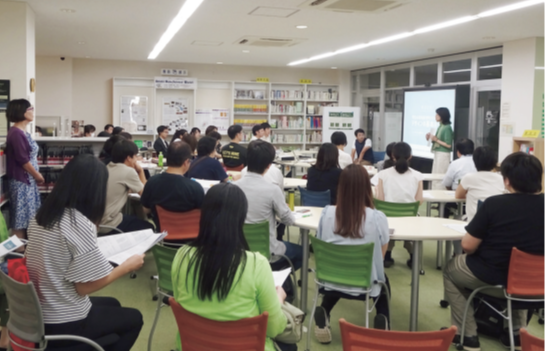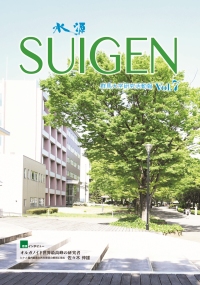

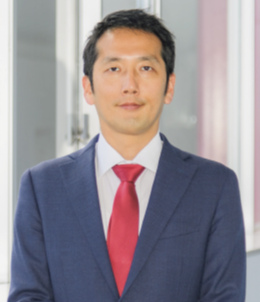 World's
Leading Researcher on Organoids
World's
Leading Researcher on OrganoidsProfessor Nobuo Sasaki of the Institute for Molecular and Cellular Regulation is one of the world's leading researchers on organoids. Organoids are a technology for culturing animal and human organs and cells in vitro. The advantages of organoids are the ability to culture normal human cells, which was impossible with conventional culture methods, and the ability to handle human organs. Professor Sasaki was involved in research on human cancer cell organoids for five years from 2011 under Dr. Hans Clevers in the Netherlands, who was the first in the world to succeed in the organoid culture method. After that, he worked at Keio University School of Medicine before establishing his laboratory at Gunma University in the spring of 2021.
He has published a series of papers in top journals, and last year he was selected as an "H papers author (a researcher who has published several papers in the top 1% of the number of times his/her paper has been cited)".
The master of organoids, who has attracted the
attention of molecular biologists worldwide, is now taking on the
challenge of elucidating the actual state of intestinal
bacteria-host interactions. He aims to establish "intestinal
design," a science that uses the power of intestinal bacteria to
freely increase or decrease the number of target cells, to
elucidate the mechanisms of disease onset, and to develop new
treatment methods.
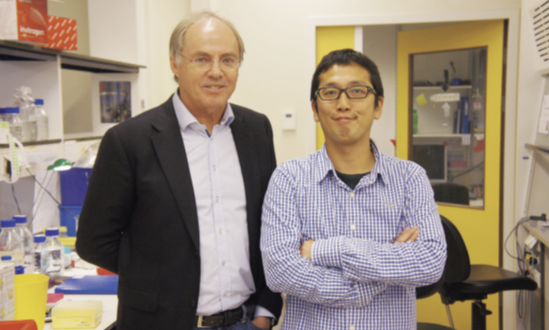
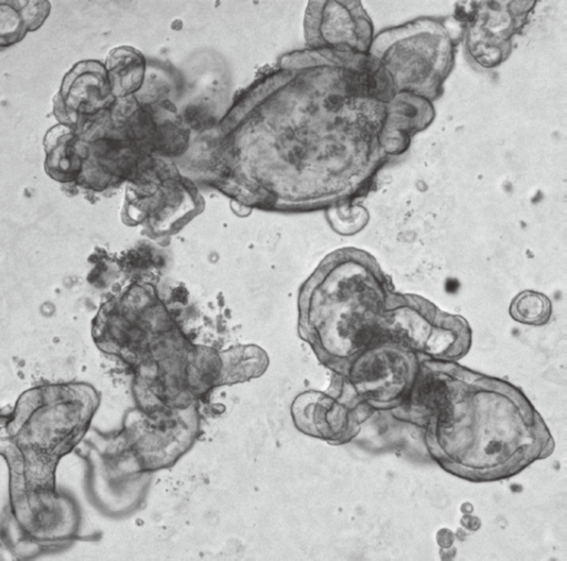
Human colorectal organoid
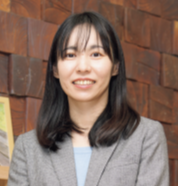 Consideration of Life and Death Perspectives of Terminal Cancer
Patients
Consideration of Life and Death Perspectives of Terminal Cancer
PatientsThe main focus of my research is to explore better communication between patients and nurses by examining the views of life and death of "terminal cancer patients" who are aware that their death is imminent.
I first became interested in this topic while working as a nurse at an acute care hospital. One terminal cancer patient said to me, "I think this is the last firework. Today is the anniversary of my mother's death." I was so struck by the words "last" and "anniversary of her death" that I could not reply to her. I regretted that if I had tried to listened to her more carefully, I might have been able to provide better nursing care that would have enabled her to live a life that was more like her own until the last moment of her life.
Even when I read articles and books, all I read was "respect the views of life and death of each person." I then went on to graduate school and began this research.
 Using
AI for Histopathological Image Analysis
Using
AI for Histopathological Image AnalysisAs a doctor, I am involved in pathology diagnostic work, while my research focuses on breast pathology and cancer. One of my research focuses on image analysis technology for pathological tissue using AI (artificial intelligence). I want to quantify the morphological features of colorectal cancer and find indicators (morphological biomarkers) that can predict treatment efficacy and prognosis.
Pathological diagnosis involves
determining benign or malignant status and identifying
histological types by annotation (labelling; see figure) of
lesions (abnormal cells and tissues). In cancerous tissues, it
also evaluates the malignancy of the cancer and determines the
indications for drugs and the effectiveness of treatment.
Morphology is essential in the pathological diagnosis of cancer. This is because malignancy is determined by morphological features such as the appearance of the nucleus and nucleoli, the frequency of mitosis, the amount of necrosis and the mode of invasion. In recent years, lymphocytes/plasma cells spreading within the cancer tissue have gained attention as markers of drug therapy efficacy and related to prognosis.
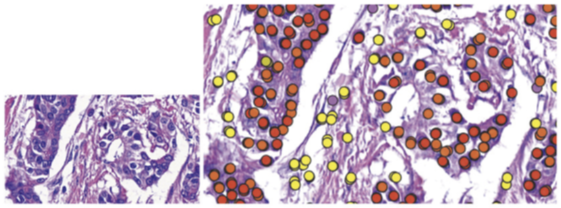
Organisational
picture before annotation (left) and post-annotation image
(right)
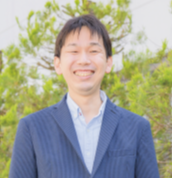 Host-Gut
Bacterial Interactions at the Genetic Level
Host-Gut
Bacterial Interactions at the Genetic Level The gut microbiota is considered "another organ" because it affects the overall health of the host. However, many unexplored aspects exist of the host and intestinal bacteria interactions. I aim to elucidate this interaction at the genetic level of intestinal bacteria.
I became interested in intestinal bacteria when I was engaged in research on the mechanism of substance-mediated symbiosis between host and intestinal bacteria at the endowed chair of the Institute of Fermentation Research established at Ishikawa Prefectural University, which is what led me to devote myself to this research.
 Young
"Information Theory" Researcher Active Worldwide
Young
"Information Theory" Researcher Active Worldwide Information theory is the study of information
and communication mathematically - it is the mathematical
modelling of digital data compression and transmission and the
mathematical clarification of compression and communication
efficiency. Associate Professor Shota Saito of the Faculty of
Informatics is one of the researchers in this field currently
attracting worldwide attention. He says that the appeal of
information theory lies in its simple and beautiful mathematical
theory, and his brilliant mathematical formulas reveal
"mathematical answers" one after another, which are published in
the world's top journals and at international conferences.
He also actively applies his information
theory research results to machine learning, information security,
and other fields. He is expected to contribute to strengthening
Japan's competitiveness in the digital field.

Limitations of lossy compression
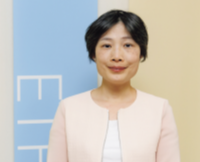 Developing
Treatments for Obesity and Diabetes by Controlling Metal
Metabolism
Developing
Treatments for Obesity and Diabetes by Controlling Metal
MetabolismAyako Fukunaka, Assistant Professor at Institute for Molecular and Cellular Regulation, is researching to clarify the role of zinc transporters in lifestyle-related diseases, particularly diabetes and obesity.
Among the essential nutrients, "minerals" are often deficient, and in Japan, the intake of 13 minerals, including calcium and iron, is encouraged. Zinc, found in pork, egg yolks, and other foods, is one such mineral. A protein called zinc transporter is necessary for zinc to be taken into each cell in the body and function properly.
Assistant Professor Fukunaka has been elucidating the role of zinc transporters in glucose and lipid metabolism. In addition to zinc transporter research, she is currently trying to understand how metal is related to obesity and diabetes. The goal is to develop new treatments for these diseases.
Gunma University has been actively recruiting
and promoting female researchers under a 10-year plan since 2013.
The university has established the promotion center "Mayudama
Plaza" at Aramaki, Showa, and Kiryu campuses, where consultation
services and educational events are planned.
Director Kowase said "The support for the
recruitment and promotion of women has changed dramatically over
the past 10 years. We have support measures to meet the challenges
of various life stages, such as returning to work after childcare
or nursing care, continuing research despite a heavy workload, and
stepping up to a higher level. I would like you to consult with us
before you worry that you have reached your limits."

